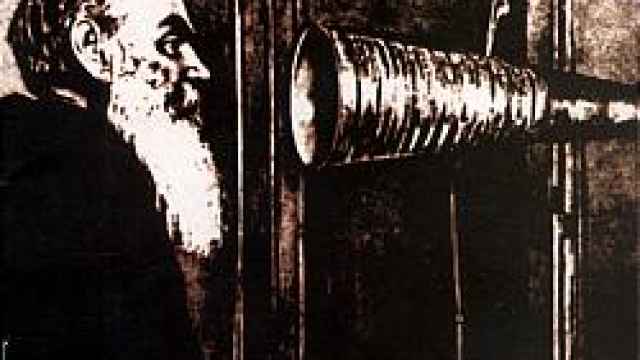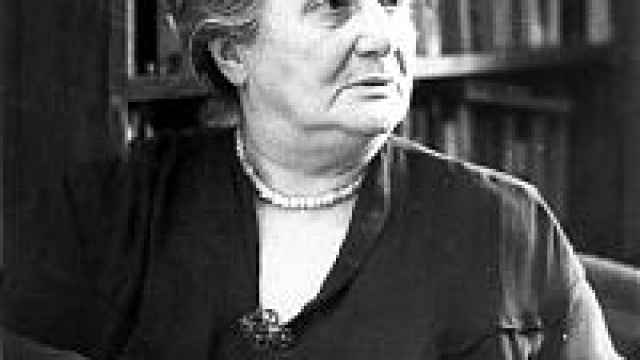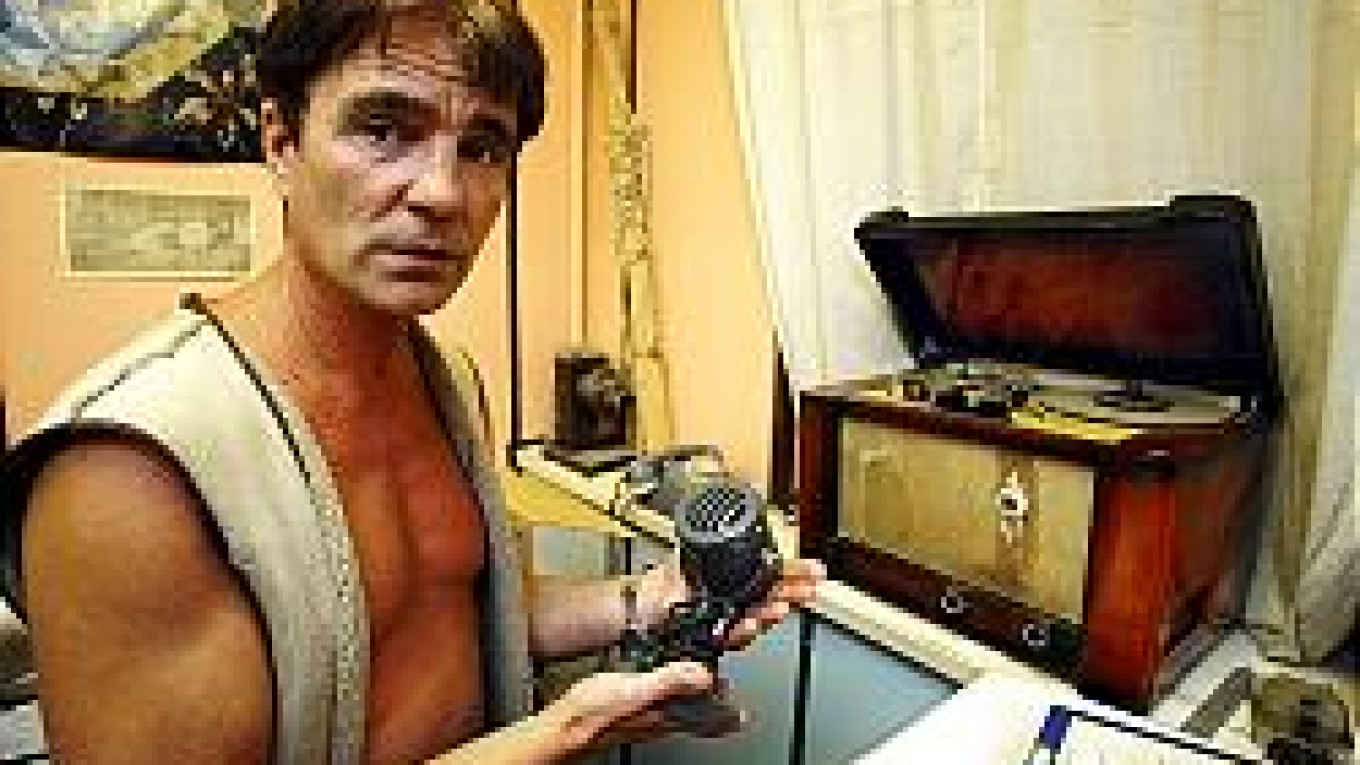As sound engineer of the State Literary Museum's Department of Audio Recordings, Filippov probably knows how some of Russia's greatest writers sounded better than anyone else. Grabbing two rough objects from a shelf in his studio, he scraped them together to imitate background noise and thundered out the verses of revolution-era poet Sergei Yesenin in such a loud imitation of the author that the dozen cuckoo clocks on the walls started rattling in their cases.
The audio archive where Filippov works numbers nearly 10,000 cylinders, records and reels, and includes rare recordings of poetry readings by long-ago greats such as Osip Mandelstam, Anna Akhmatova and Alexander Blok. Most of those recordings have already been transferred from record to magnetic tape, but even tape deteriorates over time. "My main job is to take the recording from tape to digital form," Filippov said. "Once I've done that, I've saved it from destruction."
From morning until night, Filippov, 42, painstakingly chips away at the staticky recordings in a hot underground studio draped in billowing parachute curtains and wall-to-wall landscape paintings near Patriarch's Ponds. Dressed in nothing but shorts and an open wool vest, he has a self-deprecating sense of humor and a startling laugh. Filippov is a relic of the literary scene of the 1970s: a time when people devoted themselves to the arts and rarely, if ever, got anything in return.
With a trickling budget from the Culture Ministry and a fairly specialized sphere of interest, Filippov's work is archival, not commercial. The handful of employees of the audio archive has never succeeded in selling its recordings to a wider audience. Not that it hasn't occurred to them. Last year, the audio archive put out its first compact disc, a selection of rare audio recordings by Lev Tolstoy from the dawn of the 20th century.
Sound recording came to Russia shortly after Thomas Edison's invention of the cylinder phonograph in 1877. To popularize his invention, Edison sent representatives around the world to record famous people's voices. According to Lev Shilov, head of the audio archive for the last 40 years, the first person to be recorded in Russia was probably the tsar, but those recordings did not survive.
 The audio archive put out a CD of recordings made by Lev Tolstoy in 1908 and 1909. | |
Nearly as famous as the tsar, however, was Tolstoy, author of "War and Peace" and "Anna Karenina" and founder of a populist religious movement that was quickly gathering steam. In 1895, an Edison representative came to Yasnaya Polyana, Tolstoy's estate, to record the author's voice. Those recordings were taken over the border to Berlin, where they lay in an archive until they were brought back to the Soviet Union after World War II.
In 1908, Edison sent Tolstoy a phonograph of his own. Normally suspicious of new-fangled inventions, Tolstoy was so enamored of the gift that he reportedly dragged it outside and commanded the villagers of Yasnaya Polyana to dance.
Tolstoy also turned the phonograph into an alternate form of telecommunication by recording his responses to letters on wax cylinders and sending them off in the mail. Behind the veil of static on the audio archive's new compact disc, the shaky voice of the 80-year-old can clearly be heard: "Pass along my greetings to your family," he dictated to Tatyana Kuzminskaya in March of 1908. "I'm sorry that this letter is so short. I'm speaking into a phonograph. I'm tired because I work all the time and I'm not entirely healthy."
The new compact disc also includes Tolstoy's final recordings, made in French, English and German for the Periodical Press Society just a year before his death in 1910.
Despite the tremor in his voice, Tolstoy's severe religious views come through just as sharply as they do on paper: "That the object of life is self-perfection -- the perfection perfecting, of course, immortal souls. That this is the only object of man's life is seen to be correct by the fact alone that every other object is senseless in view of death," he says in English on the new disc. Soon after Tolstoy's death, according to Shilov, records of his voice were being sold at the exorbitant price of 3 rubles and played at public movie theaters.
With the revolution in 1917, audio recording was transformed into a tool of the mass media. "The first musical recording in the Soviet Union was of the Internationale," the communist anthem, Shilov said. "It's actually a touching recording. The musicians make a lot of mistakes because they don't know the notes yet."
But for the State Literary Museum's audio archive, the critical moment came in 1919, when linguist Sergei Bernstein helped found the Institute of the Living Word and began recording poets such as Mandelstam, Blok, Akhmatova, Nikolai Gumilyov and Vladimir Mayakovsky to study how they read. Today, these recordings are the pride of the audio archive's collection.
Unlike the Tolstoy recordings, which were played only several times before being put back in their cases, the later recordings are thick with static and scratches. Transferring them to digital form, Filippov tries to weed out the static from the voice without reducing the poet to a robotic monotone.
"The trick is to take out the bad and leave in the good. That's what you need a musical ear for," he said.
But early sound technicians also made other recordings that Filippov will never get to repair. As the Stalinist purges heated up in the 1930s, many of the writers that Bernstein had recorded were deemed dangerous to the state. The Institute of the Living Word was disbanded and the cylinders consigned for several years to a storehouse in Leningrad.
In addition, certain speeches known to have been recorded are curiously missing from official archives. Most notable among them is the speech that writer Isaac Babel gave at the first congress of the Writers' Union in 1934. In view of Babel's arrest and death several years later, the recording's disappearance seems more than accidental.
"I wouldn't be surprised if those recordings suddenly turned up in the KGB archives," Filippov said. Recordings of repressed writers Marina Tsvetayeva and Mikhail Bulgakov have also long since disappeared. According to Shilov, though, it is equally possible that Babel's speech was recorded on a less durable medium and later thrown out.
 Itar-Tass Anna Akhmatova (1889-1966) recorded some of her poetry on tape in the 1950s. | |
Growing up during World War II in the Writers' Union colony of Peredelkino, just outside of Moscow, Shilov was surrounded by many of Russia's most famous literary figures and began recording their voices before he was made director of the new department of audio recordings in 1963. Famous subjects included the elderly Akhmatova, literary critic and children's book writer Kornei Chukovsky and dissident author Alexander Solzhenitsyn. And when the phonograph celebrated its 100-year anniversary in 1977, Shilov folded a selection of the archive's rarest clips, from Tolstoy to Mayakovsky, into a commemorative record.
Compared to the conditions in which Shilov worked back then, the sound restoring business has certainly improved. Transferring the old recordings to digital instead of magnetic format makes cleaning up the sound much easier, for instance.
But the archive has also suffered in the last decade. Before 1991, the Soviet Union had only one record company, Melodia, which would automatically send its recordings to several state libraries, much as U.S. publishers send their books to the Library of Congress. Shilov's audio archive often ordered copies of these recordings from the recipient libraries. But now that the recording business has split up into countless commercial firms, Filippov and Shilov have to make the rounds of the poetry readings on their own, microphone in hand.
Money is also a big concern. The machines that Filippov uses are practically museum pieces, and the audio archive receives only enough cash from the Culture Ministry to support small salaries for its employees. Of the 3,500 rubles ($117) that Filippov makes a month, significant sums go to buying materials. "In Soviet times, we used to ask radio stations to donate their old equipment for free," he said. "Now, we can't do that anymore, so half of the equipment is mine. I bought it."
For the most part, Filippov digitizes his reels off a 1960s-era Hungarian machine hooked up to a sound board and computer. But the rest of Filippov's studio is a graveyard of different machines, from an enormous Soviet studio recorder dating back to 1951 to a Dnepr-5 reel-to-reel that Akhmatova used several years later.
Even more pressing is the precarious state of the recordings themselves. Until very recently, the archive was kept in two of the basement rooms where Filippov now works. Located in a residential building, the underground collection was subject to the repairs and disrepairs of those who lived upstairs. When chess champion Anatoly Karpov built himself an apartment on the top floor of the building, the rusty old pipes in the basement began to burst, flooding the archive with boiling water on a regular basis.
Conditions are better now that the recordings have been moved to a different building, said Vladimir Kozlov, the archivist. But with the wooden closets hanging open in the musty archive rooms, the recordings are still exposed to dangerous elements. Many of the wax cylinders are covered with layers of mold, and, without any money to control the temperature, Kozlov sometimes resorts to medieval methods.
"We need to maintain a specific temperature, a specific humidity. Of course, sometimes we set up buckets of water, but it's not enough."
In view of these shortages, Kozlov would have liked the new compact discs to rake a little cash into the archive's coffers. "In principle, we'd like to sell them and make some money and buy new equipment," he said.
Despite their novelty, though, the Tolstoy recordings have not exactly topped the charts. Half of the 1,000 discs that the archive printed were given to the gift shop at the Tolstoy Museum in Moscow. The other half, earmarked for the gift shop at Yasnaya Polyana, remain in storage because of a dispute between the directors of the estate and the Moscow museum.
Fortunately, Filippov said, making money is the last thing from his mind as he sits in his studio, hour after hour, cutting out fuzz from the magnetic reels. "As soon as I start doing commercial things, I get distracted from my work," he said, comparing himself to artists Franz Schubert and Vincent Van Gogh, who were also famous for being bad salesmen.
Known for spending as much as a month on five minutes of sound, Filippov is determined to digitize the entire reel collection before it falls apart. But if he had the chance to slowly remaster one writer's voice from the original cylinders, there is little doubt in his mind as to whose he would choose. "I would do all of Tolstoy over again. All two hours of sound," he said. "But it would take me a lifetime."
A Message from The Moscow Times:
Dear readers,
We are facing unprecedented challenges. Russia's Prosecutor General's Office has designated The Moscow Times as an "undesirable" organization, criminalizing our work and putting our staff at risk of prosecution. This follows our earlier unjust labeling as a "foreign agent."
These actions are direct attempts to silence independent journalism in Russia. The authorities claim our work "discredits the decisions of the Russian leadership." We see things differently: we strive to provide accurate, unbiased reporting on Russia.
We, the journalists of The Moscow Times, refuse to be silenced. But to continue our work, we need your help.
Your support, no matter how small, makes a world of difference. If you can, please support us monthly starting from just $2. It's quick to set up, and every contribution makes a significant impact.
By supporting The Moscow Times, you're defending open, independent journalism in the face of repression. Thank you for standing with us.
Remind me later.


